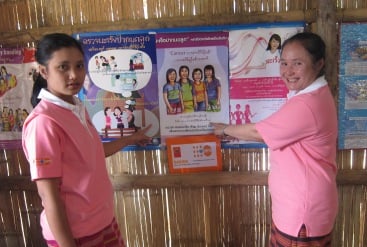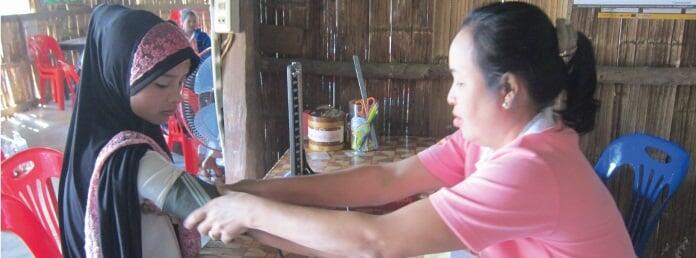MAE SOT, Thailand – Visiting a sexual and reproductive health clinic may seem ordinary for many women. But this is not the case for Saba, a 21-year-old mother who has been living in the Mae La refugee camp along Thailand’s border with Myanmar for the last two years.
Covered in a pink and black headscarf, Saba is paying a visit to one of the camp’s sexual reproductive health clinics operated by the Planned Parenthood Association of Thailand (PPAT) with the support of UNFPA, the United Nations Population Fund.
Saba recently gave birth and was seeking advice on how to delay her second pregnancy.
“I want to have time for myself. I don’t want to have the second child any time soon,” she said through an interpreter.
Access to family planning is essential to improving the health and lives of women - and it a refugee camp it becomes critical. In times of upheaval, many women lose access to family planning services, exposing them to unwanted pregnancy in perilous conditions. Living in cramped quarters, they often lack knowledge about sexual and reproductive health and hygiene.
With more than 40,000 residents, Mae La is the largest refugee camp in Thailand. Sharing a long border with Myanmar, the country has been home to one of the largest protracted refugee populations in the world, most of them from Myanmar.
Traditionally, refugee women in the Mae La camp, most of whom are ethnic Karen, did not openly visit a sexual and reproductive health clinic. Social norms and family pressure discouraged them from doing so. Additionally, most of them had married at a young age and did not discuss family planning openly.
But today, the reproductive health centre is teeming with people and young children are running about; some women even brought along their husbands. This would have been an unlikely scene just a few years ago.
Earning and building trust

The positive changes in the Mae La camp are in large part due to the partnership between UNFPA and the PPAT, which have been providing a variety of services, including counselling on domestic violence.
The partnership also works to educate camp residents about reproductive health. But instead of a relying on outside health workers and educators, the programme selected and trained a group of refugees to serve as assistant nurses and peer-educators, helping to build trust within the community.
In a small building with walls made from local jute, Naw Shair Paw, a refugee assistant nurse, speaks to Saba in Burmese. She took her weight and blood pressure before leading her to a private room for a contraceptive implant.
“I can use the needle,” said Naw Shair Paw, who was trained by Thai nurses through the UNFPA-sponsored programme.
Beaming with pride, she lifts another assistant nurse’s arm to show the spot where she had injected a contraceptive implant earlier. “Birth control provides women free time to study, like us, who can be assistant nurses.”
Dispelling myths
Before the clinic gained wide acceptance, many refugees simply did not know about the benefits of family planning and sexual and reproductive health services. Some even feared the programme would attempt to ‘control’ the refugee population.
UNFPA and the PPAT worked with local communities to dispel these myths and build demand for services by providing information about the benefits of family planning and its positive effect on maternal health and the survival of newborns. This information was conveyed by refugee nurse assistants and peer educators.
Many Muslim husbands in the camp were also reluctant to have their wives seek out family planning services, but community outreach has helped change their minds, as well. Saba's husband now supports her visits to the clinic.
“I came here many times. And now my husband understands that it is good for our family,” Saba explains.
Since 2012, UNFPA has partnered with the PPAT to provide reproductive health services in five camps across the Thai border with Myanmar.
It is estimated that more than 55,000 refugees of reproductive age directly benefited from integrated reproductive health and gender-based violence services between January and November 2013. In addition, more than 18,300 refugees, including peer educators and assistant nurses, received sexual and reproductive health and related training.
- Jeerawat Na Thalang


